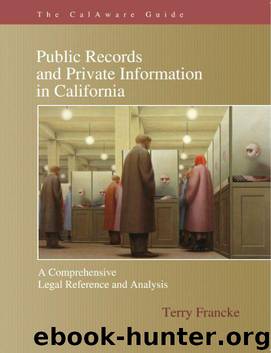The CalAware Guide to Public Records and Private Information in California by Terry Francke

Author:Terry Francke
Language: eng
Format: mobi
Tags: Legal
Publisher: Californians Aware
Published: 2011-12-13T08:00:00+00:00
I-H-2-c-vii: Investigative Interests
I-H-2-c-vii(1): What Constitutes a Protectable “Investigation”
In Haynie v. Superior Court (County of Los Angeles), 26 Cal.4th 1061 (2001) the dispute involved a CPRA request by a black man, Elgin Haynie—pulled over in his van mistakenly by sheriff’s deputies acting on a citizen’s tip about a similarly described vehicle. The request sought any and all records held by the sheriff’s department concerning that encounter, including radio dispatch tape recordings. Among Haynie’s arguments for access was that the Section 6254 (f) investigative exemption should be interpreted to apply only to the records of more substantial or protracted police involvement—not minor incidents such as traffic stops. But the Supreme Court held, in effect, that unlike agencies in general conducting investigations for law enforcement, correctional or licensing purposes, crime-fighting agencies were such that any activity they initiated based on either a dispatch instruction or their own observation was the opening phase of a law enforcement investigation entitled to the exemption, no matter how it culminated.
Haynie . . . argues that . . . "records of investigations" should be defined so as to exclude investigations that are merely "routine" or "everyday police activity," such as his traffic stop. Williams, he points out, involved a "long-term" investigation into the potential criminal conduct of law enforcement officers, and City of Hemet v. Superior Court (1995) . . . involved a "lengthy" investigation of a police sergeant's conduct. Haynie's proposed limitation finds no support in the statute. Moreover, he offers no principled basis for determining which investigations are sufficiently lengthy or important to be accorded the status of "investigations" within the meaning of section 6254(f)--nor any way to predict, at the outset, what might result in a lengthy or important investigation. One "third-rate burglary attempt," for example, ultimately toppled a president.
Haynie's concession that records of a murder investigation would be exempt further illustrates the impossibility of making such a distinction. Law enforcement officers may not know whether a crime has been committed until an investigation of a complaint is undertaken. An investigation may be inconclusive either as to the cause of death or the circumstances in which the death occurred. A fire may be suspicious, but after investigation be found to have an accidental or natural origin. In this case we have no reason to believe that the deputies who stopped Haynie were not investigating a report of what they believed might be criminal conduct.
The interpretation offered by Haynie would also impair "routine" investigations. Complainants and other witnesses whose identities were disclosed might disappear or refuse to cooperate. Suspects, who would be alerted to the investigation, might flee or threaten witnesses. Citizens would be reluctant to report suspicious activity. Evidence might be destroyed.
To avoid these evils, Haynie suggests that the exemption could apply to everyday police work if disclosure "would endanger a witness or anyone else, or if it would endanger the successful completion of any investigation." The County's failure to articulate a specific need to withhold the records here, he reasons, means they should be disclosed.
Download
This site does not store any files on its server. We only index and link to content provided by other sites. Please contact the content providers to delete copyright contents if any and email us, we'll remove relevant links or contents immediately.
Killers of the Flower Moon by David Grann(3264)
Machine Learning at Scale with H2O by Gregory Keys | David Whiting(2326)
Will by Will Smith(2077)
Guns, Germs and Steel by Diamond Jared(1894)
Borders by unknow(1792)
The Room Where It Happened by John Bolton;(1725)
The Color of Law by Richard Rothstein(1581)
Once Upon a Broken Heart by Stephanie Garber(1526)
Water Rights and the Environment in the United States by John Burch(1417)
Friends, Lovers, and the Big Terrible Thing by Matthew Perry(1351)
Examples & Explanations: Administrative Law by William F. Funk & Richard H. Seamon(1334)
A Short History of War by Jeremy Black(1310)
The Strength In Our Scars by Bianca Sparacino(1286)
HBR's 10 Must Reads 2022 by Harvard Business Review(1262)
Pharmacy Practice and The Law by Richard Abood(1259)
That Every Man Be Armed by Stephen P. Halbrook(1244)
The Guarded Gate by Daniel Okrent(1227)
515945210 by Unknown(1219)
Injustices by Ian Millhiser(1204)
